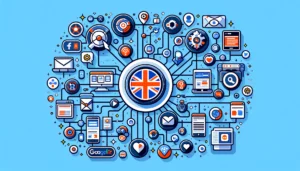The Power of Omnichannel Marketing: How UK Brands Can Leverage Google Ads and Beyond

Omnichannel Marketing: In today’s digital age, a strong online presence is no longer a luxury; it’s a necessity for UK brands of all sizes. Consumers are bombarded with marketing messages across countless channels, from social media and email to search engines and online reviews. To stand out in this crowded landscape, businesses need a strategic marketing approach that reaches their target audience consistently and effectively.
While Google Ads remains a powerful tool for driving targeted traffic and generating leads, relying solely on this platform can leave gaps in your marketing strategy. Imagine a potential customer who sees your ad, clicks through to your website, but then gets lost in the digital maze. Without a cohesive marketing presence across various channels, you may miss the opportunity to nurture their interest and convert them into a loyal customer.
Key Takeaways for Omnichannel Marketing
- Omnichannel marketing is essential for UK brands to create a consistent and effective online presence across multiple channels.
- Integrating Google Ads with other digital marketing channels like social media and email can enhance the overall reach and impact of your campaigns.
- Data and analytics play a crucial role in understanding customer journeys and optimising marketing strategies for better results.
- Emerging platforms and advanced technologies like AI and machine learning are shaping the future of omnichannel marketing.
- Case studies of successful UK brands provide valuable insights and lessons for implementing effective omnichannel campaigns.
Omnichannel Marketing: A Necessity for UK Brands
The Evolution of Consumer Behavior
In the evolving world of digital marketing in the United Kingdom, organisations are striving for omnichannel excellence, aiming to seamlessly connect online and offline interactions to provide a unified and holistic customer journey. Recognising that customers want a consistent brand experience across all touchpoints, organisations are breaking down barriers between physical and digital channels. Embracing the power of omnichannel marketing is more critical than ever in our increasingly connected world.
The Role of Digital Channels
Omnichannel marketing is a customer-centric strategy that provides a seamless shopping experience across multiple channels, whether online or offline. In today’s digital age, customers expect to interact with brands through various platforms — from social media and online shops to physical stores. An effective omnichannel approach integrates all these touchpoints, ensuring consistent brand messaging and a smoother customer journey.
Google Ads agencies, with their deep understanding of online data and audience targeting, are perfectly positioned to bridge the gap between your Google Ads campaigns and a broader marketing strategy. They can leverage insights from your Google Ads performance to inform and optimize marketing efforts across other channels. This ensures your brand message and offerings reach your target audience consistently, no matter where they are in their online journey.
Why a Unified Approach Matters
At its core, omnichannel marketing solutions aim to recognise and respond to the interconnected nature of modern consumer behaviours. Customers now expect to move fluidly between devices and platforms when engaging with brands. A successful omnichannel strategy leverages this behaviour, using analytics tools to gather data from each interaction and apply insights to refine and optimise the customer experience across every channel. By doing so, brands can meet customers wherever they are with tailored experiences, ultimately driving higher customer retention rates and fostering trust and loyalty.
In the competitive landscape of digital marketing, an omnichannel approach is no longer just an option but a necessity. It addresses the evolving needs of customers who use multiple digital channels and devices in their path to purchase.
Leveraging Google Ads in an Omnichannel Marketing Strategy
Integrating Google Ads with Social Media
Integrating Google Ads with social media platforms like Facebook and TikTok offers a holistic approach to digital advertising. This strategy ensures consistency across search, social media, and email marketing, building a cohesive brand experience. By connecting all touchpoints, you create a seamless customer journey that enhances engagement and conversion rates.
Cross-Channel Remarketing Tactics
Cross-channel remarketing allows you to re-engage customers who have interacted with your brand across different platforms. This tactic is particularly effective in driving conversions, as it reaches the right customer with the right message at the right time. PPC management becomes more efficient when you create smart segments and build lookalike audiences to reach new customers.
Optimising Ad Spend Across Platforms
Optimising your ad spend across various platforms is crucial for maximising ROI. By refining your media spend, you can focus your budget on areas that drive the most results. For instance, one client used an omnichannel strategy to reduce cost per acquisition (CPA) by 67%. This approach is essential for any PPC eCommerce agency looking to deliver high-impact results for their clients.
Remember, the digital advertising landscape is constantly evolving. Staying ahead of the competition requires ongoing optimisation efforts. Prioritise continuous optimisation to ensure your Google Ads campaigns are always performing at their best and driving the most possible revenue.
Beyond Google Ads: Expanding Your Digital Reach
Harnessing the Power of Social Media Ads
Social media platforms like Facebook, Instagram, and LinkedIn offer robust advertising solutions that can complement your Google Ads PPC efforts. By leveraging these platforms, you can reach a broader audience and engage with users in a more interactive and personalised manner. Social media ads allow for advanced targeting options, enabling you to tailor your campaigns to specific demographics, interests, and behaviours. This level of precision can significantly enhance your overall marketing strategy.
Email Marketing: A Complementary Tool
Email marketing remains one of the most effective channels for nurturing leads and maintaining customer relationships. When integrated with your Google Adwords PPC campaigns, email marketing can help you create a cohesive customer journey. Use email campaigns to follow up on leads generated through PPC ads, provide valuable content, and encourage repeat purchases. A well-executed email marketing strategy can drive conversions and build long-term customer loyalty.
Exploring Omnichannel Marketing Emerging Platforms
The digital landscape is constantly evolving, with new platforms and technologies emerging regularly. Staying ahead of the curve means being open to experimenting with these new opportunities. Platforms like TikTok, Snapchat, and even emerging voice search technologies offer unique ways to connect with your audience. By diversifying your digital marketing efforts beyond traditional Google advertising agencies, you can tap into new markets and stay ahead of the competition.
Expanding your digital reach requires a multi-faceted approach. By integrating social media ads, email marketing, and exploring emerging platforms, you can create a robust omnichannel strategy that drives results.
The Role of Data and Analytics in Omnichannel Marketing
Data and analytics are the backbone of any successful omnichannel marketing strategy. By leveraging customer data, you can gain a deep understanding of customer behaviour and preferences. This insight allows you to tailor experiences that resonate with your target group, enhancing customer engagement and loyalty.
Understanding Customer Journeys
Critical to every robust omnichannel marketing strategy is the ability to effectively measure impact across online and in-store touchpoints. With store visits, online interactions, and social media engagements, understanding the customer journey becomes complex but incredibly rewarding. Granular insights into customer behaviour can help you create personalised experiences that drive engagement and sales.
Utilising Advanced Analytics Tools
The emergence of sophisticated analytics tools and AI-powered platforms like Skai has empowered brands with the insights and capabilities needed to execute complex omnichannel strategies. These technologies enable businesses to collect and analyse vast amounts of data across multiple touchpoints, providing the granular insights needed to create personalised customer experiences at scale.
Measuring Campaign Success
Improved attribution data is one of the biggest bonuses of omnichannel marketing. It allows you to track engagement across channels to gain an accurate picture of the customer buying journey. You learn where customers prefer to engage and see which marketing campaigns add the most value. This data can further refine future strategies and set sales forecasts.
The data omnichannel sales and marketing delivers is quite literally a gold mine. You can see how a consumer behaves and interacts in one medium—social media, say—and connect it to all interactions, allowing for deeper insights.
Case Studies: UK Brands Succeeding with Omnichannel Marketing
UK retail brands have been at the forefront of adopting omnichannel marketing strategies. For instance, Marks & Spencer has seamlessly integrated its online and offline channels, providing a unified shopping experience. By leveraging data analytics, they ensure personalised customer interactions, which has significantly boosted their customer retention rates.
In the eCommerce sector, ASOS stands out with its innovative omnichannel approach. They have effectively utilised social media platforms to engage with their audience, driving traffic to their website. Additionally, their mobile app offers a seamless shopping experience, contributing to a substantial increase in mobile sales. ASOS’s strategy highlights the importance of integrating various digital channels to enhance customer engagement.
Leading UK brands have demonstrated that a successful omnichannel strategy requires a deep understanding of customer behaviour. By analysing customer journeys, these brands can tailor their marketing efforts to meet the specific needs of their audience. Investing in advanced analytics tools has proven to be a game-changer, enabling brands to measure campaign success accurately and make data-driven decisions.
Embracing the power of omnichannel marketing is more critical than ever in our increasingly connected world. As consumers rely on seamless experiences across platforms, the pressure is on for businesses to step up their game.
Best Practices for Implementing Omnichannel Campaigns
Creating Consistent Messaging
To ensure your omnichannel marketing strategy is effective, it’s crucial to maintain consistent messaging across all channels. This means your brand’s voice, imagery, and vision should be uniform whether a customer interacts with you via email, social media, or in-store. Consistency builds trust and reinforces brand identity.
Personalising Customer Interactions
Personalisation is at the heart of successful omnichannel marketing. Utilise data to tailor interactions based on user profiles and past behaviours. This can include personalised email campaigns, targeted social media ads, and customised website experiences. Smart content that adapts to the customer’s journey can significantly enhance engagement and conversion rates.
Ensuring Seamless Channel Integration
For a truly omnichannel experience, all your marketing channels must work together seamlessly. This involves integrating your CRM, marketing automation tools, and analytics platforms to create a unified view of the customer. Process mining can help identify bottlenecks, while robust data integration ensures a comprehensive understanding of the customer journey.
A unified approach not only improves customer satisfaction but also boosts loyalty and retention, making your marketing efforts more effective.
Future Trends in Omnichannel Marketing
The Impact of AI and Machine Learning
Artificial Intelligence (AI) and Machine Learning (ML) are revolutionising omnichannel marketing. These technologies enable brands to predict consumer needs and behaviours with unprecedented accuracy. Expect to see an increase in the use of AI and ML for predictive analytics, driving even more personalised customer experiences. This means that your marketing efforts can be more targeted, efficient, and effective, ultimately leading to higher ROI.
The Growing Importance of Mobile
Mobile devices are becoming the primary touchpoint for consumers. As such, optimising your omnichannel strategy for mobile is no longer optional—it’s essential. From mobile-friendly websites to app-based interactions, ensuring a seamless mobile experience can significantly impact customer satisfaction and engagement. Remember, a poor mobile experience can deter potential customers, so prioritise improvements to your mobile performance.
Predictions for the Next Decade of Omnichannel Marketing
Looking ahead, omnichannel marketing is set to become even more integrated and intelligent. Advances in big data, AI, and ML will continue to fuel this transformation, allowing marketers to better understand, anticipate, and meet customer needs across various channels. Additionally, emerging technologies like augmented reality (AR) and virtual reality (VR) could offer new ways to engage with consumers, providing immersive and interactive experiences.
Embracing the power of omnichannel marketing is more critical than ever in our increasingly connected world. As consumers rely on seamless experiences across platforms, the pressure is on for businesses to step up their game.
Conclusion for Omnichannel Marketing
In the ever-evolving landscape of digital marketing, UK brands must embrace the power of omnichannel strategies to stay ahead of the competition. By leveraging Google Ads alongside other marketing channels, businesses can create a cohesive and engaging brand experience that resonates with their target audience. The integration of advanced analytics and machine learning further enhances the effectiveness of these campaigns, ensuring that every customer interaction is meaningful and impactful. As consumers continue to navigate a complex digital ecosystem, an omnichannel approach not only drives conversions but also fosters long-term customer loyalty and retention. In essence, the future of successful marketing lies in the seamless blend of multiple channels, delivering the right message to the right customer at the right time.
Frequently Asked Omnichannel Marketing Questions
What is omnichannel marketing?
Omnichannel marketing is a strategic approach that integrates multiple marketing channels to create a seamless customer experience. It ensures consistency across various touchpoints such as social media, email, search engines, and more.
Why is omnichannel marketing important for UK brands?
In today’s digital age, consumers interact with brands across multiple channels. Omnichannel marketing helps UK brands provide a consistent and cohesive experience, increasing customer loyalty and conversion rates.
How can Google Ads be integrated into an omnichannel strategy?
Google Ads can be integrated with other marketing channels such as social media and email marketing. This allows for cross-channel remarketing, where ads are shown to potential customers who have interacted with the brand on different platforms.
What are the benefits of using data and analytics in omnichannel marketing?
Data and analytics help brands understand customer journeys, measure campaign success, and optimise their marketing strategies. Advanced analytics tools can provide insights into customer behaviour, enabling more personalised and effective marketing efforts.
Can small businesses in the UK benefit from omnichannel marketing?
Yes, small businesses can greatly benefit from omnichannel marketing. By providing a consistent experience across various channels, small businesses can compete with larger brands and build strong customer relationships.
What are some emerging platforms to consider in an omnichannel strategy?
Emerging platforms such as TikTok, LinkedIn, and Amazon Ads offer new opportunities for brands to reach their target audience. Exploring these platforms can help brands stay ahead of the competition and expand their digital reach.
Author
Search Blog
Free PPC Audit
Subscribe to our Newsletter
The Voices of Our Success: Your Words, Our Pride
Don't just take our word for it. With over 100+ five-star reviews, we let our work-and our satisfied clients-speak for us.
"We have been working with PPC Geeks for around 6 months and have found Mark and the team to be very impressive. Having worked with a few companies in this and similar sectors, I rate PPC Geeks as the strongest I have come across. They have taken time to understand our business, our market and competitors and supported us to devise a strategy to generate business. I value the expertise Mark and his team provide and trust them to make the best recommendations for the long-term."
~ Just Go, Alasdair Anderson



